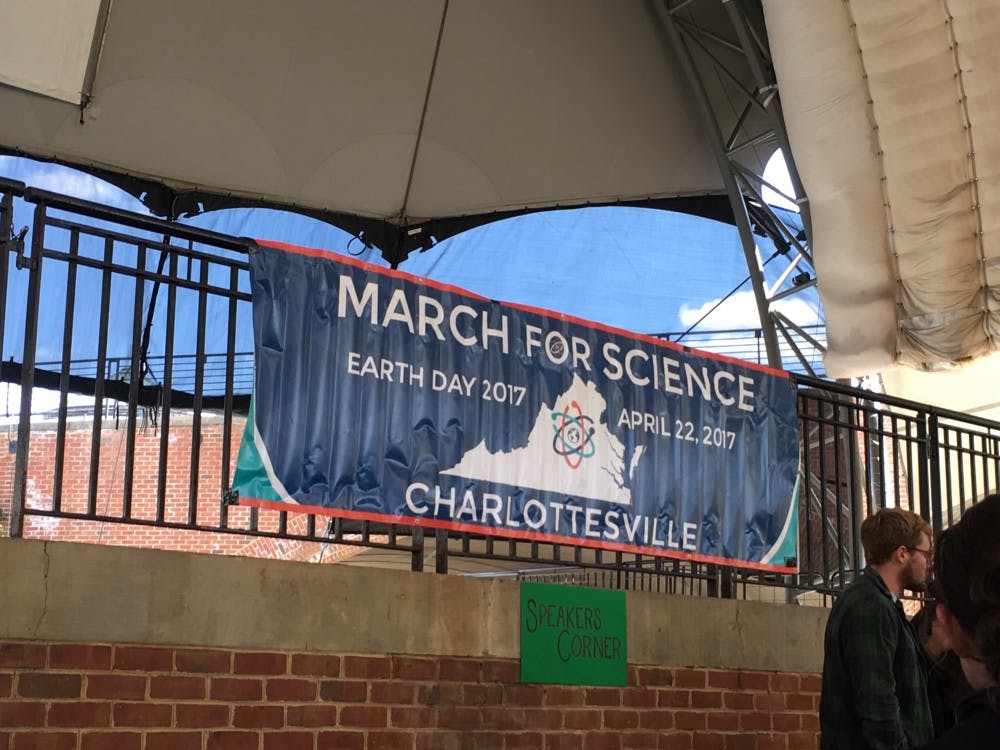As a reprise of last year’s March for Science, nearly 400 scientists and community members gathered Sunday at the Sprint Pavilion in downtown Charlottesville to celebrate and advocate for the role of science in both individual and national decision-making. Organized by the non-profit Cville Comm-UNI-ty, Sunday’s march was preceded by a science festival that featured five speakers and thirty booths and exhibitions.
Kelly Barford, co-founder of Cville Comm-UNI-ty, said that the Science Festival — which she hopes to make an annual event — distinguished this year’s march. Engaging all ages, the topics of the festival’s booths ranged from “the colorful science of rainbows” to the science of brewing.
“We’re trying to show everyone that even if you don’t call yourself a scientist, science is a part of your everyday life regardless of how old you are,” Barford said.
Many local businesses — like Splendora's Gelato, who presented the science behind frozen desserts, and Babylon Micro-Farms, who showed how in-home hydroponics systems work — participated in the festival. Other exhibitions focused on national science issues affecting the public and distributed information regarding the mechanisms of climate change and conservation of national parks.
“Science helps us know what works,” said Jean Lorber, a representative of the Nature Conservancy. “We hope to explain to the general public why science is important.”
The festival targeted not only the general public but also scientists — booths were dedicated to showing scientists how to communicate their work and become more involved in their community. For example, a booth hosted by the Science Policy Initiative informed how policy is made and how funding for science in the federal budget is determined.
The march following the festival was a call to action that focused on inspiring participants to call their lawmakers and advocate for evidence-based science.
“We’re trying to communicate that science is integral in everyday life in decision-making, and that transfers over to policy-making as well,” Barford said.
Barford and her co-founders began planning for the festival and march after recognizing that a gap existed between the academic scientists at the University and the community at large in Charlottesville. Barford and her team decided to use the energy from the first March for Science to form their own non-profit and integrate science with local Charlottesville by hosting science trivia nights and showing movies followed by discussions on ethics.
“People really do value science and scientists, but I think a lot of people sometimes forget how much science plays into their everyday life,” Barford said.
Meeting once a month since November, Barford and her team members developed subcommittees that specialized in the event’s programming, advertising, logistics, fundraising and finances. The event was primarily funded by a grant from the American Society for Cell Biology, fundraising events at Vitae Spirits and the Three Notch'd Craft Kitchen & Brewery and donations collected through a GoFundMe page.
According to festival attendees Dan Lysy, a retired director of transportation at the Richmond Regional Transportation District Commission, and Helen Lysy, a retired drug discovery analyst at Pharmaceutical Product Development, the efforts of Barford and her team have paid off. As new residents to Charlottesville, the Lysys wanted to learn more about their community and keep in touch with science happenings.
“Science can solve a lot of your problems,” Helen Lysy said. “We’re glad to see increased awareness of science and of what it can contribute.”
In the future, Barford and her non-profit hope to continue integrating the academic community the University with the general public while advocating for evidence-based policy on the national level.
“We hope to leave Charlottesville better than we found it,” Barford said. “Or at least, we hope to give it something new.”







